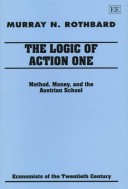Economists of the Twentieth Century
2 total works
Such conviction is demonstrated in the first part of this book, where Professor Rothbard analyses method. The second part focuses on some of the theoretical debates within the Austrian school, including property and justice rights, welfare economics, value and efficiency. In the third section Rothbard considers the Austrian approach to money and calculation, including discussion of the definition of the supply of money, freely floating exchange rates and calculation and its role under socialism.
This latest volume of Murray Rothbard’s work goes some way to represent the important contributions he made to the field. The second volume of Murray Rothbard’s essays on Austrian economics is also available.
The Logic of ActionTwo is a careful selection of Rothbard's most important scholarly articles. Some have appeared in mainstream journals, others have been long out of circulation, and still others are published here for the first time. It was Rothbard's major ambition to shore up the scientific status of the Austrian School and, at the same time, demonstrate the theory's radical, free-market implications for government policy.
The book confirms Rothbard as an intellectual giant, and presents his many contributions to the Austrian School, a systematic alternative to mainstream thought that reaches radical, free-market policy conclusions.

